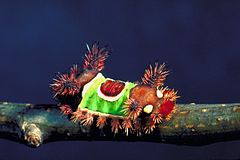Saddleback caterpillar
| Saddleback caterpillar | |
|---|---|

| |

| |
| Scientific classification | |
| Kingdom: | |
| Phylum: | |
| Class: | |
| Order: | |
| Family: | |
| Genus: | |
| Species: | A. stimulea
|
| Binomial name | |
| Acharia stimulea (Clemens, 1860)
| |
| Synonyms | |
| |
The saddleback caterpillar, Acharia stimulea (formerly Sibene stimulea), is the larva of a species of moth native to eastern North America. The species belongs to the family of slug caterpillars, Limacodidae.
The caterpillar is primarily green with brown at either end and a prominent white-ringed brown dot in the center which resembles a saddle. It has a pair of fleshy horns at either end. These and most of the rest of the body bear urticating hairs that secrete an irritating venom. Contact with the hairs causes a painful, swollen rash and sometimes nausea in humans.[1] The hairs should be removed from the skin immediately to prevent more venom spread. The cocoon may also have irritating hairs and hairs from the larva can fall on surrounding objects.[2]
The larva feeds on a large variety of plants. In Florida and Alabama in the United States, it feeds on ornamental palms such as the Manila palm (Adonidia merrillii).
The adult is a dark brown, stout-bodied moth.
References
- ^ Hyche, L. L. Stinging Caterpillars: A Guide to Recognition of Species Found on Alabama Trees. Entomology. Auburn University. 1998.
- ^ Bibbs, C. S. and J. H. Frank. Acharia stimulea (Clemens) (Insecta: Lepidoptera: Limacodidae). EENY-522. University of Florida IFAS. 2012.
